A Conversation With Elizabeth Mims and Jason Tippet (ONLY THE YOUNG)
When I first discovered Elizabeth Mims and Jason Tippet’s feature debut at the 2012 True/False Film Festival, I made this rather bold declaration: “After only one viewing, I’m ready to file Only The Young in the all-time coming-of-age canon.” After a second viewing, I stand behind that statement. This brisk, bracingly poignant portrait of teenagers living in Santa Clarita, California, sneaks up on you by making you think you’re getting into a film about reckless juvenile delinquents, only to realize that they are as good-natured, decent, wise-beyond-their-years, adorable, and hilarious as kids could possibly be. Mims and Tippet shirk their film’s potentially superficial punk rock trappings by employing a formalistic visual approach and a classic soul music soundtrack. Ultimately, and perhaps most importantly, this feels like a film made by filmmakers who are young enough to truly understand their young subjects. Only The Young is a very special film. In the days leading up to its theatrical bow at the IFC Center on Friday, December 7, 2012—thanks to distributor Oscilloscope Pictures—I spoke on the phone with Mims and Tippet about how they pulled off such an adorable magic trick.
***But first, thanks once again to Oscilloscope, watch this exclusive clip!***
Hammer to Nail: I’m usually always interested in asking this question right off the bat, but I think for you guys it especially applies. Was your initial plan a broader one, to, say, make a “teenage movie,” and then you searched for kids to bring that idea to life, or did these kids in particular inspire the movie?
Jason Tippet: Liz and I made a short called Thompson, and I don’t think we finished saying everything we wanted to say about growing up. And it was still something we wanted to cover, but we weren’t sure exactly what kids we were gonna follow yet. I’m kind of obsessed with this place where I grew up, Santa Clarita, and we both wanted to make another film about kids growing up there, but we weren’t exactly sure who yet. But when we went to this skate park, it almost fell into place too easily. Liz and I talk about how these people just kind of find us.
Elizabeth Mims: Yeah, they do.
JT: We don’t ever go looking for people too intensely. They really found us, which is kind of strange.
EM: I think as soon as we started filming them, the first interview we were doing, it was clear that these kids were going to lead us to this bigger theme of that little window of time you have in your life where you don’t really have a car and you really want one, and you don’t really have responsibilities yet. We had always talked about when you’re at that age you really want these things but there are these little moments of, like, traveling around town on your skateboard or in a grocery cart.
JT: That freedom where you don’t realize it’s freedom yet.
H2N: The first time I saw the movie at True/False, it left me feeling really buoyant and joyous, and then the second time the darker realities weighed much more heavily. When it came to the more personal and intimate material—whether it be Skye’s situation with her mother, or the awkward kiss triangle—how did you guys approach things to make sure that the kids didn’t feel exploited and you didn’t feel like you were exploiting them?
 EM: Especially with Skye for us, on those days where we knew something bigger had happened, with her living situation and all of that, I think because we had spent so much time with them—we were thinking about this the other day, we had been through all these experiences that brought us so much closer to them, which sounds kinda cheesy, but it’s true—and I think that once we had that [comfort level], when these bigger issues came up, they were talking to us as friends. By not moving the camera or anything, we were able to have these very real conversations with them about what was going on. And because we were so in tune and listening to everything they said… Jason, what did Garrison say about it? He said—and not like therapy—but he was able to talk to someone who would actually listen. I don’t remember his exact words.
EM: Especially with Skye for us, on those days where we knew something bigger had happened, with her living situation and all of that, I think because we had spent so much time with them—we were thinking about this the other day, we had been through all these experiences that brought us so much closer to them, which sounds kinda cheesy, but it’s true—and I think that once we had that [comfort level], when these bigger issues came up, they were talking to us as friends. By not moving the camera or anything, we were able to have these very real conversations with them about what was going on. And because we were so in tune and listening to everything they said… Jason, what did Garrison say about it? He said—and not like therapy—but he was able to talk to someone who would actually listen. I don’t remember his exact words.
JT: I think that’s pretty close to what he said. Also, I don’t think we would have been able to make this movie if we were too much older. The decision to not maybe go into these things as much meant that would lead into a whole other set of plot points and storylines; this was stuff that we felt was a part of their lives, but we didn’t want to over-dramatize any one situation. We wanted to touch on these things, but with kids it’s kind of easy to really pinpoint a problem and then go with that. “Oh, he’s the kid who’s cutting himself. We’re gonna follow that through the whole movie and it’s gonna be an issue.” For me as a kid, I don’t really remember it ever being so dramatic. You’d find out someone was doing something like that, and it was like, “Yeah, that’s happening,” but it was never a huge deal. Maybe that’s just being naïve and young and not taking things seriously.
H2N: When it comes to Skye, though, even though she seems to have the toughest draw, she also seems to be really strong and matter-of-fact about things, even when she’s breaking down and crying about it.
EM: I think too because we were pretty sensitive to them being bored or us asking these questions so frequently that they don’t want to talk about them anymore, that I think we didn’t dwell on things so long that they became obnoxious, which was important for them. Some days, Skye wants to talk about this and some days she does not, she didn’t want to talk about Robin. I think because we never really pushed it, we were fortunate enough to get these moments when they really wanted to talk about it.
H2N: I love that this movie is 68 minutes long—or should I say ‘short.’ Movies are way too long, or at the very least, more movies need to be how long they should be, without a minute-count in mind. With regards to shaping your narrative, had you always foreseen that graduation would be a perfect way to go out, or was there another point when you decided you had the footage you needed to make the movie you wanted to make?
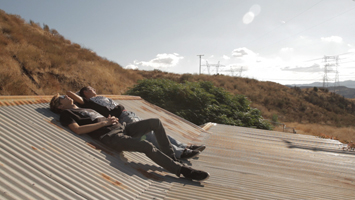 JT: I think we always knew that the graduation is where we wanted to wrap things up, because we didn’t want to have a very “wrapped up” ending. You had an idea where these people were going, but if we kept following them, even for five or six months after that, it would’ve been the same ending kind of, just dragged out. Originally, our idea was we’d film ‘til graduation, and as it got closer and with everything going on in their lives, it just felt right to end it there.
JT: I think we always knew that the graduation is where we wanted to wrap things up, because we didn’t want to have a very “wrapped up” ending. You had an idea where these people were going, but if we kept following them, even for five or six months after that, it would’ve been the same ending kind of, just dragged out. Originally, our idea was we’d film ‘til graduation, and as it got closer and with everything going on in their lives, it just felt right to end it there.
EM: I totally agree with that. For us, because we were editing as we were filming, by that point—I mean, it changed a lot after that—but we knew we had something that would hopefully lend itself to something bigger, and that’s where we didn’t need to keep going with it necessarily. We could have filmed forever. It was a really hard to say, “Okay, we’re gonna stop now.”
JT: As for keeping it short, in film school, we [were taught] to make things as lean as possible and not wasting people’s time. You have these people for a little while so you should probably try to say something with that time. We really wanted to make something that was compact. You know, we appreciate long shots, but we didn’t want anything to be pretentiously long. And it was our first feature so I think we were just nervous, like, “Well, shit, if we make this 85 minutes, people are gonna start leaving.” I think we’re both so worried about wasting people’s time.
EM: It’s true! Because we went to school watching incredibly long… I mean, CalArts made us sit through the longest, most experimental films. And I think that somewhere, it’s instilled within us, that anything that’s longer than necessary… I don’t know, I think it’s funny.
JT: I love CalArts.
EM: We were seriously able to develop our style there, which is what’s incredible. But we were exposed to so much work that we knew we never wanted to make.
JT: There are people who do that really well, like James Benning, but there’s this army of kids at CalArts who all want to be James Benning so badly.
EM: There’s only one James!
H2N: You guys do still take a more formal approach to your material. Would you say that this locked off framing style simply reflects your own personal taste buds, or was it in reaction to what people typically expect when you’re talking about skateboard kids and being a teenager and stuff like that?
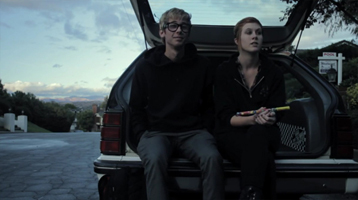 EM: We developed that style earlier with Thompson, our first short, which had very different subject matter. But both Jason and I love Robert Yeoman’s cinematography and things like that, so we decided early on that between these two-shots and photographing these kids in this landscape, it works really nice for them to be facing the camera in a symmetrical way, so that we can see them interact. Which we also discovered in Thompson. So it started there, but we developed it and changed some things for this film.
EM: We developed that style earlier with Thompson, our first short, which had very different subject matter. But both Jason and I love Robert Yeoman’s cinematography and things like that, so we decided early on that between these two-shots and photographing these kids in this landscape, it works really nice for them to be facing the camera in a symmetrical way, so that we can see them interact. Which we also discovered in Thompson. So it started there, but we developed it and changed some things for this film.
JT: Also, there’s this filmmaker who came out of CalArts, David Fenster, and he made these shorts that are more like process films. One’s about a wood plant that processes wood. His films were all shot on tripod and I loved his movies, but I’m also a huge fan of American Movie and I really wanted to make something that was more about characters than the process of how things work. Also, with the short, I think Liz and I figured out as well… with documentary, we were trying to figure out why things felt so impersonal? And one of the things I think you always notice is that there are people following these people: it’s hand-held, there’s zooms, the camera is very very interactive. And so we wanted to shoot a short with prime lenses—in the short the camera actually doesn’t move at all. It’s completely still. And we couldn’t really get away with that with this movie. We started losing a lot of moments. I remember, it was like four days into shooting, they’re just so much more active than the other kids we followed, it just wasn’t gonna work.
H2N: How about the music? That’s another place where you took a refreshingly atypical approach. It immediately snaps you to attention in a way that using NOFX or Black Flag or any of the bands the kids actually listen to might not have. Did you conceive of that from the very beginning?
JT: That was one of the first choices we made. I was editing another doc for a filmmaker and we were listening to a lot of soul music. I think a lot of soul music is about heartbreak and loving people who don’t love you back. When we met these kids, it felt like the right kind of language for a coming-of-age teenage film. I’m sure people have used soul music before, with coming-of-age movies, but we wanted to do the whole thing with it, so at that point we started looking for a lot more of it. We were always putting it in. There are a few montages we still had in the movie that used these songs we just couldn’t get rights to.
EM: Honestly, editing, we just enjoyed it so much that I think you can feel it. Like, we would get so excited about these segments—especially the opening one of them coming through the tunnel. We just dropped one of those tracks in just to see and there was this perfect little bell and the light comes through. When I watch that, I still get as excited as when we were first editing, which makes me really happy.
H2N: I’m about to get back into the music clearance nightmare myself. Before you really started decapitating your babies, did you draw the line and say, “Okay, there are three of these tracks that we absolutely must have,” and place a hierarchy on things?
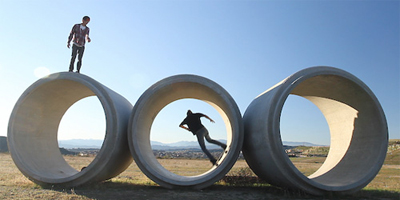 EM: I feel like we were terribly unorganized with all that stuff so that it wasn’t until the end we finally found out how much everything actually was. We did know, “Okay, there’s a couple tracks we can’t live without.” But it was one of those things where we completely fell in love with most of it. I feel like that’s one class we missed in school, was how much all this stuff costs. ‘Cause it was like, “Oh, we’ll figure it out eventually, or maybe it won’t matter ‘cause the film won’t go anywhere, it’ll just be for us and we’ll love it.” We kind of made excuses for ourselves about it. But I definitely knew that opening song, and we also knew the song when they’re in the arcade, when he takes Kristen on that date, Benny Johnson [“Baby I Love You”]… there were a couple we were really ready to fight for at the end. And we got super lucky because the licensing company who owns most of that music, was pretty generous to us. But still, it was definitely difficult to lose a couple of those. I think the big one—I don’t know if it was in the True/False version—but the shopping cart one was different.
EM: I feel like we were terribly unorganized with all that stuff so that it wasn’t until the end we finally found out how much everything actually was. We did know, “Okay, there’s a couple tracks we can’t live without.” But it was one of those things where we completely fell in love with most of it. I feel like that’s one class we missed in school, was how much all this stuff costs. ‘Cause it was like, “Oh, we’ll figure it out eventually, or maybe it won’t matter ‘cause the film won’t go anywhere, it’ll just be for us and we’ll love it.” We kind of made excuses for ourselves about it. But I definitely knew that opening song, and we also knew the song when they’re in the arcade, when he takes Kristen on that date, Benny Johnson [“Baby I Love You”]… there were a couple we were really ready to fight for at the end. And we got super lucky because the licensing company who owns most of that music, was pretty generous to us. But still, it was definitely difficult to lose a couple of those. I think the big one—I don’t know if it was in the True/False version—but the shopping cart one was different.
JT: “Tipping Strings.”
EM: “Tipping Strings” was the one we cried for days about.
JT: Seriously, it’s such an incredible song and it fit so well there… the hard thing about music rights is there’s all this music you want to use in films when you’re first starting and this was a hard realization that you’re not gonna be able to use a lot of these songs you listen to. We didn’t spend anything on this movie. We bought hard drives and the equipment, and we had to do a Kickstarter for our music rights—it was like 24,000 dollars and like 20 of that went to paying off the music. And then we still had to go find more money to replace some other songs…
EM: That’s been our whole budget, really.
H2N: It’s such chip against us independent filmmakers, whether documentary or narrative. It makes it that much harder for our films to be taken seriously, I think.
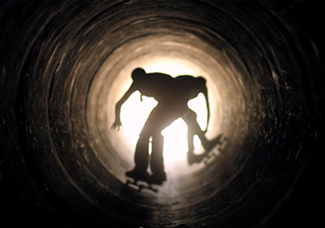 EM: One thing I wanted to mention earlier, the silver lining of our heartbreak, I guess, would be that we’ve got Nick Thorburn now, from Islands, who offered to compose tracks specifically for these pieces that became little holes in the film. So, we are really thrilled and fortunate that he has come through with that. It’s been great. As skeptical as we were that we could never match what we had, he really made some great stuff.
EM: One thing I wanted to mention earlier, the silver lining of our heartbreak, I guess, would be that we’ve got Nick Thorburn now, from Islands, who offered to compose tracks specifically for these pieces that became little holes in the film. So, we are really thrilled and fortunate that he has come through with that. It’s been great. As skeptical as we were that we could never match what we had, he really made some great stuff.
JT: Another thing I think is funny is that the Unicorns were around when we were kids, so it’s like the person who was composing the soundtrack to our youth [composed the soundtrack for this movie].
H2N: Regarding my bleaker second viewing… the first time, when Garrison breaks up with Kristen, I think I was mostly pulling for him to get back with Skye, so I was like, “Oh, cool, the stars are aligning.” But the second time, the fact that he was simply obeying these religious elders and saying things like, “I mean, they’re wiser than I am,” made it more disturbing. I’m wondering what type of reactions you’ve gotten to this, and if it’s something you were concerned about putting into the film, knowing that it might really fire up some viewers.
EM: I think we actually really struggled with that. Especially being there and interviewing them and hearing them say these things. The first struggle was to not shake them and be like, “What are you talking about?” Kristen even says, “Women are supposed to be more submissive.” And so, Jason and I both agree that we don’t want to try to change their lives or influence them in a way that they wouldn’t have been. So we made a big effort not to say anything. And I think that in the film, because we cut that scene together, we knew that since Garrison had been getting pressure from these religious people in his life, we had to be really careful about it. But it was one of those things where that was also a battle, because we wanted to include that so people would understand what their world was more like. Without that piece, I don’t know, it was so important to actually hear them say those words and then hopefully, as we watch further, see them develop a little bit more and hopefully come into themselves.
H2N: Also, by understating the religious element the way you guys do, it isn’t even necessarily about religion as much as it is that pressure of adult influence, whether it’s a parent or a teacher. And that is just about a 100% universal element to being that age.
EM: It gets a different reaction with different audiences, but I think it feels different even to me every time I watch it. But like you said, it’s an influence that they can’t really avoid.
— Michael Tully








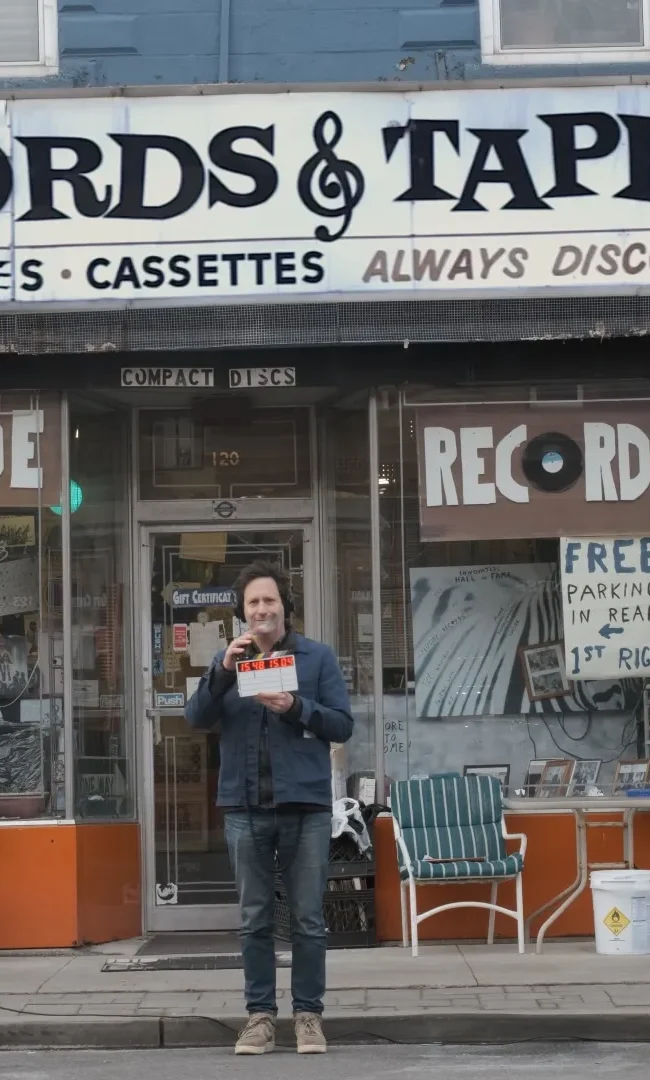
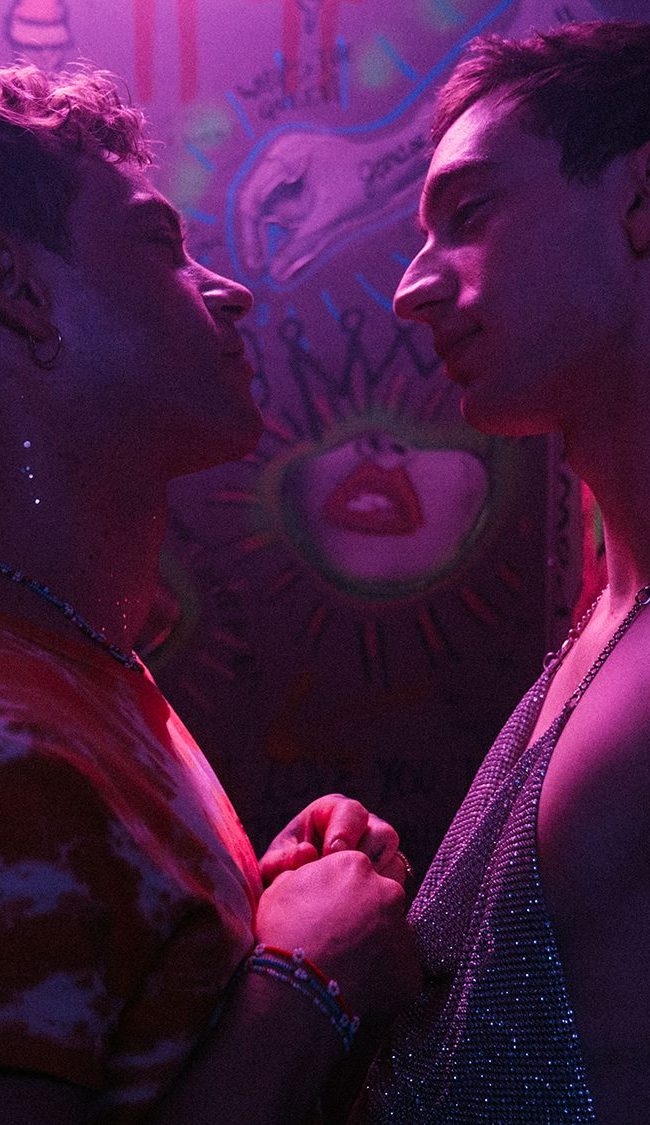


Pingback: HOME VIDEO PICKS – Hammer to Nail